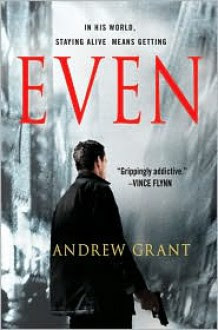 |
| 4 out of 5 stars |
Magical jade—mined, traded, stolen, and killed for—is the lifeblood of the island of Kekon. For centuries, honorable Green Bone warriors like the Kaul family have used it to enhance their abilities and defend the island from foreign invasion.
Now the war is over and a new generation of Kauls vies for control of Kekon's bustling capital city. They care about nothing but protecting their own, cornering the jade market, and defending the districts under their protection. Ancient tradition has little place in this rapidly changing nation.
When a powerful new drug emerges that lets anyone—even foreigners—wield jade, the simmering tension between the Kauls and the rival Ayt family erupts into open violence. The outcome of this clan war will determine the fate of all Green Bones—from their grandest patriarch to the lowliest motorcycle runner on the streets—and of Kekon itself.
Recommended for people who love both The Godfather and kung fu movies.
I found I really had to be in the right mood to get started with this book (and it took me longer than usual to read it). I started it 3 or 4 times before I finally made it beyond the first few pages and discovered what a marvelous world Fonda Lee has created here. So it wasn’t the book at fault, it was my mood.
This is a fantasy world, where jade mined from the country of Kekon has magical qualities and some of the people of the realm have a special sensitivity to the stone. They get extra-special powers when they wear the stones, turning a regular person into someone with extra-strength, super-perception, etc. (they are known in Kekon as Green Bones). It’s real Crouching Tiger, Hidden Dragon stuff.
But this is very, very much a book about the two clans who uneasily share the city of Janloon, the No Peak clan and the Mountain clan. And let me tell you, they could give the Mafia a run for their money! It’s all about honour, family, & clan. May the gods help you if you disrespect any of these or if you try to trade loyalties!
The reader comes to know the main members of the No Peak clan intimately. There’s Lan, the Pillar (like the CEO) of the clan; Hilo, the Horn (the enforcer); and Shae, the sister who is trying to forge her own way in the world and separate herself from the gang lifestyle that she grew up with.
This is an extremely well-written, well-realized fantasy world. To my caucasian, North American eyes, this was exotic stuff, but I always knew what Lee was writing about, what she was trying to do. I loved her complex system of magic and the rules that governed it. If you’re sensitive about violence, I would say, “Set this book down and walk away. Jade City is not for you.” That’s one of the reasons why it took me so long to read the book—I could only take so much death & destruction per day.
This author will be at the conference that I’m attending in mid-August and I will definitely be fan-girling.





















